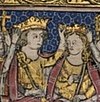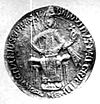Latin Emperor
This article needs additional citations for verification. (September 2014) |
| Emperor of Constantinople | |
|---|---|
Imperial | |
 attributed arms (historically used by Philip of Courtenay) | |
 | |
| Details | |
| First monarch | Baldwin I |
| Last monarch | Baldwin II |
| Formation | 16 April 1204 |
| Abolition | 25 July 1261 |
| Residence | Bucoleon Palace |
The Latin Emperor was the ruler of the Latin Empire, the historiographical convention for the Crusader realm, established in Constantinople after the Fourth Crusade (1204) and lasting until the city was reconquered by the Byzantine Greeks in 1261. Its name derives from its Catholic and Western European ("Latin") nature. The empire, whose official name was Imperium Romaniae (Latin: "Empire of Romania"), claimed the direct heritage of the Eastern Roman Empire, which had most of its lands taken and partitioned by the crusaders. This claim however was disputed by the Byzantine Greek successor states, the Empire of Nicaea, the Empire of Trebizond and the Despotate of Epirus. Out of these three, the Nicaeans succeeded in displacing the Latin emperors in 1261 and restored the Byzantine Empire.
Latin emperors of Constantinople, 1204–1261
[edit]| Portrait | Name | Reign | Succession | Life details |
|---|---|---|---|---|

|
Baldwin I Baudouin |
9 May 1204 – 14 April 1205 (11 months and 5 days) |
Son of Baldwin V, Count of Hainaut and Margaret I, Countess of Flanders. Crowned emperor on 16 May 1204 in the Hagia Sophia | July 1172 – 1205/1206 (aged 33–34) Married to Marie of Champagne (2 daughters). Captured by the Second Bulgarian Empire in the Battle of Adrianople; died in captivity. |

|
Henry Henri |
20 August 1206 – 11 June 1216 (9 years, 9 months and 22 days) |
Brother of Baldwin I; ruled as regent until the news of his brother's death arrived to Constantinople | 1178 – 11 June 1216 (aged 37–38) Married to Agnes of Montferrat and Maria of Bulgaria. Died of natural causes |

|
Peter Pierre |
July 1216 – 1217 (1 year) |
Son of Peter of Courtenay, also a cousin of king Philip II of France; crowned emperor in Rome by Pope Honorius III on 9 April 1217 | Married Yolanda of Flanders (10 children). Captured by the despot of Epirus, Theodore Komnenos Doukas in 1217; died in captivity some time after. |

|
Yolanda Yolande |
1217 – August 1219 (2 years) |
Daughter of Baldwin V, Count of Hainaut and wife of Emperor Peter | 1175 – August 1219 (aged 44) Made an alliance with Theodore I Lascaris of the Empire of Nicaea. Died of natural causes |
| Regency of Conon de Béthune (1219) and Giovanni Colonna (1220–1221) | ||||

|
Robert I | 25 May 1221 – early 1228 (6 years) |
Son of Emperor Peter and Yolanda, crowned emperor after an interregnum | Married Lady of Neuville. Died of natural causes in the Principality of Achaea while traveling back to Constantinople. |

|
John Jean |
9 April 1229 – 23 March 1237 (7 years, 11 months and 14 days) |
Son of Erard II, Count of Brienne, crowned senior co-emperor and regent for Baldwin II | 1170 – 23 March 1237 (aged 67) Married Stephanie of Armenia (1 son) and Berengaria of León (4 children). Only Latin emperor to die in Constantinople. |

|
Baldwin II Baudouin |
23 March 1237 – 25 July 1261 (24 years, 3 months and 28 days) |
Son of Emperor Peter and Yolanda. Still a child in 1221, he ruled under John's regency until 1237 | late 1217 – October 1273 (aged 56) Married Marie of Brienne (1 son). Fled during the Reconquest of Constantinople. |
Latin emperors of Constantinople in exile, 1261–1383
[edit]
Latin Empire was disestablished in 1261, but Latin states in Greece, also known as Frankokratia, continued to recognize Latin emperors in exile as their overlords until 1383.
- Baldwin II (1261–1273), in exile from Constantinople
- Philip I (1273–1283), his son
- Empress regnant Catherine I (1283–1307), his daughter, with...
- Charles (1301–1307), her husband
- Empress regnant Catherine II (1307–1346), their daughter, with...
- Philip II (1313–1331), her husband
- Robert II (1346–1364), their son
- Philip III (1364–1373), his brother
- James (1373–1383), his nephew
James of Baux willed his titular claims to Duke Louis I of Anjou, also claimant to the throne of Naples, but Louis and his descendants never used the title.
